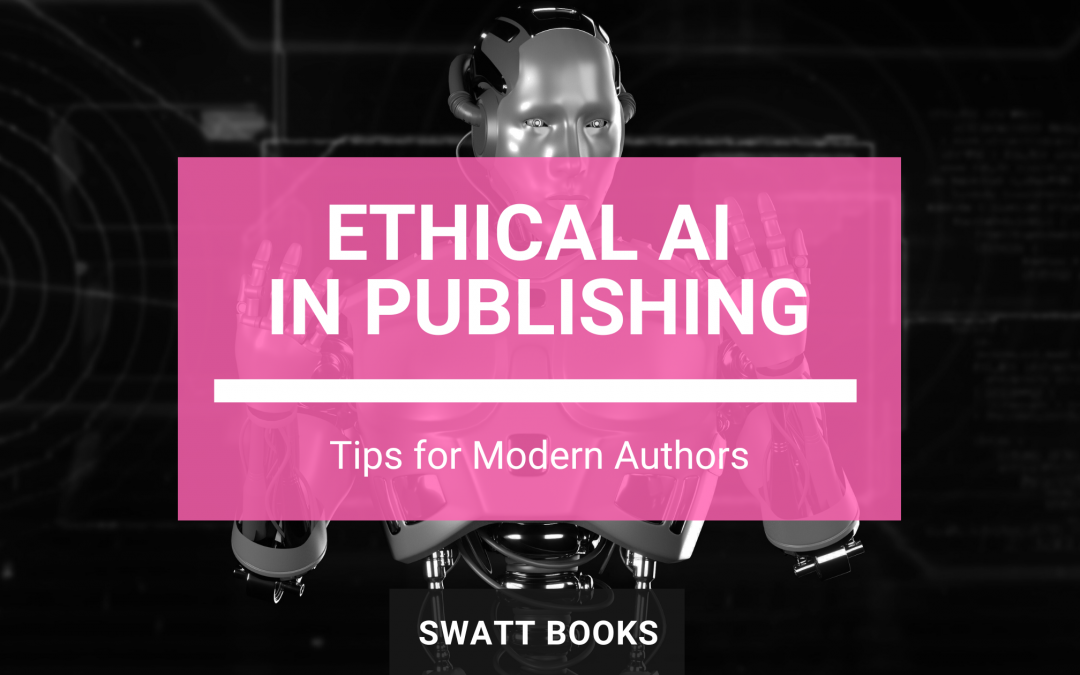Are you wondering how artificial intelligence can transform your writing and publishing process? Discover how AI in publishing is revolutionising the world of books, offering unprecedented tools for content creation, editing, research, and marketing. In this article, I want to delve into the ways AI can enhance the writing process for business authors, streamline the production of high-quality books, and open up innovative marketing opportunities.
Artificial intelligence (AI) is nothing new. The concept of logical machines has been around since the 11th century, and the earliest examples of machines capable of reasoning were put into use during World War II with Alan Turing’s ‘Enigma’ code-breaking machine. In the 90s, AI started to quietly appear as parts of much larger systems throughout the technology industry, including data mining, robotics, logistics, speech recognition, banking software, medical diagnostics, and, of course, Google’s search engine.
But AI has come on leaps and bounds since then. It forms the basis of every search and social media platform we interact with daily, impacting what we see and learning from our interactions and engagement. The public release of ChatGPT by OpenAI on 30 November 2022 sparked an AI boom, which has led to rapid investment and development of AI technology that has influenced nearly every industry, including publishing.
Many industries were blindsided by the sudden public accessibility to AI that ChatGPT represented, and 2023 was a year of turmoil and adjustment as the publishing industry came to terms with what AI meant to authors, publishers, and the reading public. But AI in publishing holds vast potential benefits for authors, including efficiency in the writing and creation process, enhancements to book quality, and new and interesting marketing opportunities.
Let’s first look at some of the ways that AI in publishing can benefit business authors and make our job of writing and publishing great books easier.
AI for Content Creation

First, there is the use of AI tools and technology to aid us in the initial writing process. Large language tools like ChatGPT are great at helping us brainstorm ideas and then outline those ideas into a coherent narrative that takes our readers through our content logically and beneficially.
It can also be used to help us draft initial content, but I would emphasise a huge amount of caution in doing this. It is important that we, as authors, use AI as a supplement to our writing, NOT as a replacement. We must maintain originality and our personal voice; that is the only way to build genuine, long-lasting connections with our readers once we engage with them off the page.
I used ChatGPT extensively during the writing of my 4th book The Write Strategy (due out in November 2024), but it didn’t write any part of the book for me. I used it to help me flesh out my book skeleton to make sure that I covered all the subtopics that would help my readers get a complete picture of how and why they should use book publishing as a strategy to boost their business. Once I had that skeleton, I would use it at the start of each writing session to ask for a series of talking points for each section I was writing; again, to make sure that I covered that topic thoroughly. I then wrote from the talking points using my own knowledge, experience, and expertise to discuss each talking point from my point of view and the vantage point of my readers.
AI for Editing and Proofreading

Because the large language AI models of ChatGPT can exhibit human-like traits of reasoning, cognition, attention, and creativity, they are perfect tools to help in the editing and proofreading process. They can help with grammar, style, and consistency checks much more accurately than a human can. Tools like Grammarly, ProWritingAid, and Hemingway Editor are excellent resources to put your draft manuscript through to help enhance its quality before you invest in professional human editing.
Note that I do not advocate that you replace human editors with AI tools. They are a great way to fine-tune your manuscript, but they cannot replace the feedback you can get from a professional editor. It does, however, help in reducing your editing costs because it has helped you weed out all the basic stuff, freeing your editor to focus on the bigger picture.
AI for Research

Since the upgrade of ChatGPT-4 and its ability to search the entire internet beyond its original training data set, it has become a great tool to expedite the process of research by quickly gathering relevant information and data together. However, AI providers like OpenAI are quick to point out that AI systems can still make mistakes. You should always corroborate any AI-generated research to ensure its accuracy and reliability.
Marketing with AI

This is where I think the biggest benefit can come for authors in using AI tools, as it holds the most opportunity for innovation and creativity. By prompting ChatGPT to act as a marketing specialist, it can suggest optimised social media campaigns or generate copy for targeted advertising using best practices for your chosen marketing platform, based on the knowledge it has learned from real-world marketing specialists.
The use of AI in marketing has also taken a step change recently in terms of the creation of marketing collateral. The vast majority of content creation tools that we all know and love, such as Canva, Descript, HubSpot, and Yoast, now include AI tools built right in to help speed up and enhance the content creation process.
Understanding IP Constraints
Now that we have explored some of the different ways you can ethically use AI tools in your writing and publishing activities, we need to discuss how this fits into the current publishing landscape in terms of constraints placed on the use of AI in publishing.
As I mentioned, the launch of ChatGPT sent the publishing industry into a little bit of a panic during 2023 over concerns about the protection of intellectual property, given that most modern large language AI tools were trained using existing content, much of which is under IP protection in some form or another. This prompted many of the public-access distribution platforms like Amazon and IngramSpark to draft policy changes in a bid to protect already published works from inadvertent copyright infringement through the use of AI-generated content.
As of writing (June 2024), the current policies in place by these platforms are:
IngramSpark:

Taken from the IngramSpark User Guide (Version 2.6, published March 4, 2024)[1]
Amazon:

Taken from the Amazon KDP Content Guidelines[2]
Amazon took their policies one step further to include a restriction on the number of publications a user could submit to the KDP platform in a given period[3], and now asks authors whether submitted publications contain any AI-generated content as part of the listing process.
I agree with both policies and the stance of both IngramSpark and Amazon in focusing on human authorship and original content to prevent the publication of fully AI-generated books.
Ethical Considerations
This neatly brings us to the ethical considerations that we, as authors, should consider when deciding if and how we use AI technology in our writing. It is important that, first and foremost, we are transparent with our readers about the use of AI-assisted content that appears in our published books. If you use tools like Midjourney, Firefly, or DALL-E in the creation of your book cover artwork, attribute credit to the platform just as you would a human illustrator or designer.
I also encourage you to maintain integrity and authenticity in your work. Your readers are investing money and time to buy and read your book; you should strive to honour that commitment by giving them the value of your personal knowledge, expertise, and experience—something that no AI model can generate on your behalf because it has not lived your life.
Ensuring Compliance
The biggest complication I see in the ability of platforms like Amazon and IngramSpark to monitor and police AI in publishing is the fact that AI technology is evolving so rapidly. A mere 18 months after its first release, ChatGPT has gone through four major iterations. As of March 2023, there were 14,700 artificial intelligence startups registered in the United States alone[4]. It is nearly impossible to keep up!
My advice to you as an author if you want to incorporate AI into your writing and publishing process is this:
- Check the most up-to-date content policies for any publishing platform you plan on using before submitting your book for listing.
- Thoroughly review and revise AI-generated content to add personal insights and your own unique perspective to ensure originality.
- Subscribe to author organisations such as the Alliance of Independent Authors, Society of Authors, or the Independent Publishers Guild to stay up-to-date with the latest policies and the impact that AI is having specifically on publishing and authorship.
- Ensure that there is a balance between leveraging AI tools and preserving your creative essence in any area of your book or publishing process where you want to integrate AI.
- Always view AI as a collaborative tool rather than a replacement for your creativity, expertise, experience, and insights.
Next Steps
Artificial intelligence is rapidly transforming the landscape of writing and publishing, offering innovative tools that enhance content creation, editing, research, and marketing. By leveraging these AI advancements, business authors can produce high-quality books more efficiently while maintaining authenticity and ethical standards. As AI continues to evolve, staying informed about the latest developments is crucial for staying ahead in the industry.
To keep up with future insights and trends on AI in publishing, subscribe to our blog and follow us on social media. Stay connected and be the first to learn about the latest tools, strategies, and opportunities that can help you succeed as an author in the digital age.
[1] https://www.ingramspark.com/hubfs/downloads/user-guide.pdf, accessed June 18, 2024
[2] https://kdp.amazon.com/en_US/help/topic/G200672390#aicontent, accessed June 18, 2024
[3] https://www.kdpcommunity.com/s/article/Update-on-KDP-Title-Creation-Limits, accessed June 18, 2024
[4] https://contentatscale.ai/blog/how-many-ai-tools-are-there/#howmanyaitoolsarethere, access June 18, 2024





